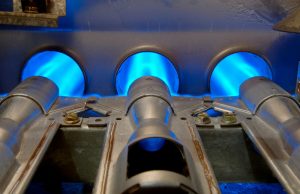 More than 64 million homes in the U.S. use natural gas for winter heat. That number alone can give you an idea of the safety issues with gas furnaces—i.e. not that many. If gas furnaces posed a basic health threat to a home, they wouldn’t be installed in so many of them around the country. Current standards for the manufacturers of natural gas furnaces place a special emphasis on maintaining safe operation. Furnaces are designed with numerous safeguards, such as a limit switch that prevents a furnace from overheating.
More than 64 million homes in the U.S. use natural gas for winter heat. That number alone can give you an idea of the safety issues with gas furnaces—i.e. not that many. If gas furnaces posed a basic health threat to a home, they wouldn’t be installed in so many of them around the country. Current standards for the manufacturers of natural gas furnaces place a special emphasis on maintaining safe operation. Furnaces are designed with numerous safeguards, such as a limit switch that prevents a furnace from overheating.
However, no natural gas appliance can ever be 100% problem-proof. Although you shouldn’t fret about using your gas furnace during the winter, you should make sure you take precautions each year to help it keep up its safety record.
One Possible Furnace Hazard
The furnace issue that’s most likely to create a safety concern is a crack in the heat exchanger. The heat exchanger is the metal chamber in the furnace that heats up from combustion gas and then transfers that heat to the air passing through the furnace cabinet. In other words, the heat exchanger is where the actual “heating” part of a furnace’s operation happens.
The exhaust gas inside the heat exchanger is toxic, but the furnace vents it safely away through a flue and out of the house. But if cracks form in the heat exchanger, these harmful gases can escape as the metal expands from the heat. The gases will enter the air that’s being blown around the rest of the house!
Heat exchanger cracks usually only happen in furnaces that have been in use for more than 15 years. That’s enough time for corrosion to set in from the chemical reaction of the metal of the heat exchanger and the combustion gases. We recommend replacing a furnace when it is more than 15 years old to help prevent this (and other) problems. Any sign of corrosion on the furnace is a reason to call for repairs. Clicking sounds from the furnace after the blower fan shuts off are another warning of a cracked heat exchanger.
Remember Routine Maintenance
The best way to prevent danger from a cracked heat exchanger—or any other furnace safety issue—is to always have the furnace given an inspection and check-up before winter starts. (If you didn’t do this last year, we recommend scheduling it now. Better late than to skip it entirely.) Technicians can catch problems early or recommend having an older furnace replaced.
Whenever you believe there’s something wrong with your gas furnace, do not hesitate to contact us for furnace repair in Livingston, NJ or elsewhere in our service area. Do not attempt to repair a furnace yourself, or allow an amateur to do it. This is actually the biggest safety risk of all! Only licensed technicians are legally permitted to work on any appliance connected up to a gas main. To ensure your furnace is not only repaired but repaired safely, rely on our expertise.
Air Creations, Inc. serves Central and Northern New Jersey with heating and cooling. “We Do It Right!”








